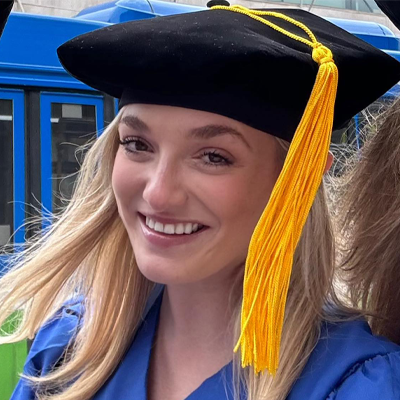MIRECC / CoE
MIRECC Matters - Fall 2024 - Putting Recovery Into Practice
Introducing Dr. Bridget Shovestul

Dr. Bridget Shovestul recently joined us as a postdoctoral fellow in late August. She received her Ph.D. in Clinical Psychology from the University of Rochester with a certification in Quantitative Methodology. She recently completed her clinical internship at the VA Maryland Health Care System/University of Maryland Internship Consortium in the Serious Mental Illness (SMI) track. During graduate school, Bridget's research interests revolved around social-cognitive deficits, social pleasure dysfunction, and socio-environmental factors for psychosis risk, in individuals with schizophrenia-spectrum disorders (SSDs). She demonstrated a particular interest in the how these factors may lead to the onset and/or exacerbation of social functioning difficulties and social isolation in these disorders, and disruptions in the underlying functional neural circuitry involved. Leveraging her understanding of these processes, Bridget is currently interested in improving upon existing EBTs (Evidence Based Treatments), or creating novel behavioral interventions, that target social-information processing deficits that often lead to social avoidance and social functioning difficulties in Veterans with SMI.
1) Tell us about your area of research
Since my time completing my undergraduate degree at University of Maryland, College Park, I have completed several full-time research positions working with individuals with SMI. Some of these roles include investigating biological risk markers for schizophrenia as a Research Training Scholar within the Treatment Research Program at the Maryland Psychiatric Research Center (MPRC); coordinating clinical trials examining the efficacy of ketamine treatment in individuals with treatment-resistant mood disorders as a Research Training Award Fellow at NIMH; and conducting independent research in SSDs as a doctoral student at University of Rochester.
During graduate school, I refined my research interests through my role on two research studies. For one of these projects, I conceptualized and launched a study examining the social defeat hypothesis of psychosis. Specifically, I examined the impact of a form of acute social defeat (i.e., social exclusion), delivered through a laboratory-based paradigm, on psychotic-like experiences, and whether chronic, discriminatory experiences mediate this relationship. I also led efforts on a study investigating various aspects of social cognition and/or social-information processing in individuals with and without SSDs, leveraging methods from lab-based experiments, ecological momentary assessment, and fMRI. As part of this line of research, I worked in close collaboration with community mental health organizations to develop and implement strategies to increase participant study retention and identify and reduce socio-environmental barriers to engagement in the research process.
Throughout graduate school, however, I developed a specific interest in social affective forecasting (SAF), or the ability to accurately predict one's future emotional experience during a social interaction, in SSDs . My dissertation examined the extent and nature of affective forecasting inaccuracies in SSDs relative to non-SSDs, how they relate to social anhedonia, and whether functional connectivity in a candidate neural network (i.e., default mode network) may help explain SAF inaccuracy in SSDs. I continued my interest in SMI research while on internship, working on a study with Alicia Lucksted, examining the efficacy of a novel intervention designed to support the application of individualized goals, values, and preferences within their own communities in a SMI population of Veterans.
.
2) What studies/programs of research are you currently working on?
I am ecstatic to be working with Mary Katherine Howell on her Career Development Award (CDA) examining the feasibility and acceptability of Written Exposure Therapy in Veterans with co-occurring PTSD and SMI. This experience will be an invaluable opportunity for me to observe an early career investigator execute a research plan as part of a VA-funded investigation, while also providing me additional clinical assessment experience working with Veterans with SMI. Additionally, I continue to have an interest social pleasure deficits in SSDs, how they inform our understanding of observed social functioning impairments in Veterans with SSDs, and formulating interventions that might improve social functioning in this population. In the meantime, I am currently working on final preparations of a manuscript from my dissertation research project, and am continuing to familiarize myself with the policies and practices of the VA and MIRECC.
3) What are the potential benefits of your program of research for Veterans?
America is currently facing a social isolation and loneliness epidemic. More so, Veterans with SMI often experience unique challenges and symptoms related their SMI diagnosis that further contribute to social functioning difficulties and social isolation. Ultimately, I hope that my research interests and projects can help improve social motivation, social functioning outcomes, quality of life, and instill hope for recovery, in Veterans with SMI.
Inside this Issue
The Importance of Veteran Engagement in VA Clinical and Research ActivitiesIntegrating Tobacco Treatment into Mental Health Clinics: Provider and Veteran Perspectives Introducing Haley Miles-McLean Introducing Bridget Shovestul Mental Health Lived Experience Community of Practice Awards MIRECC Matters Homepage



















